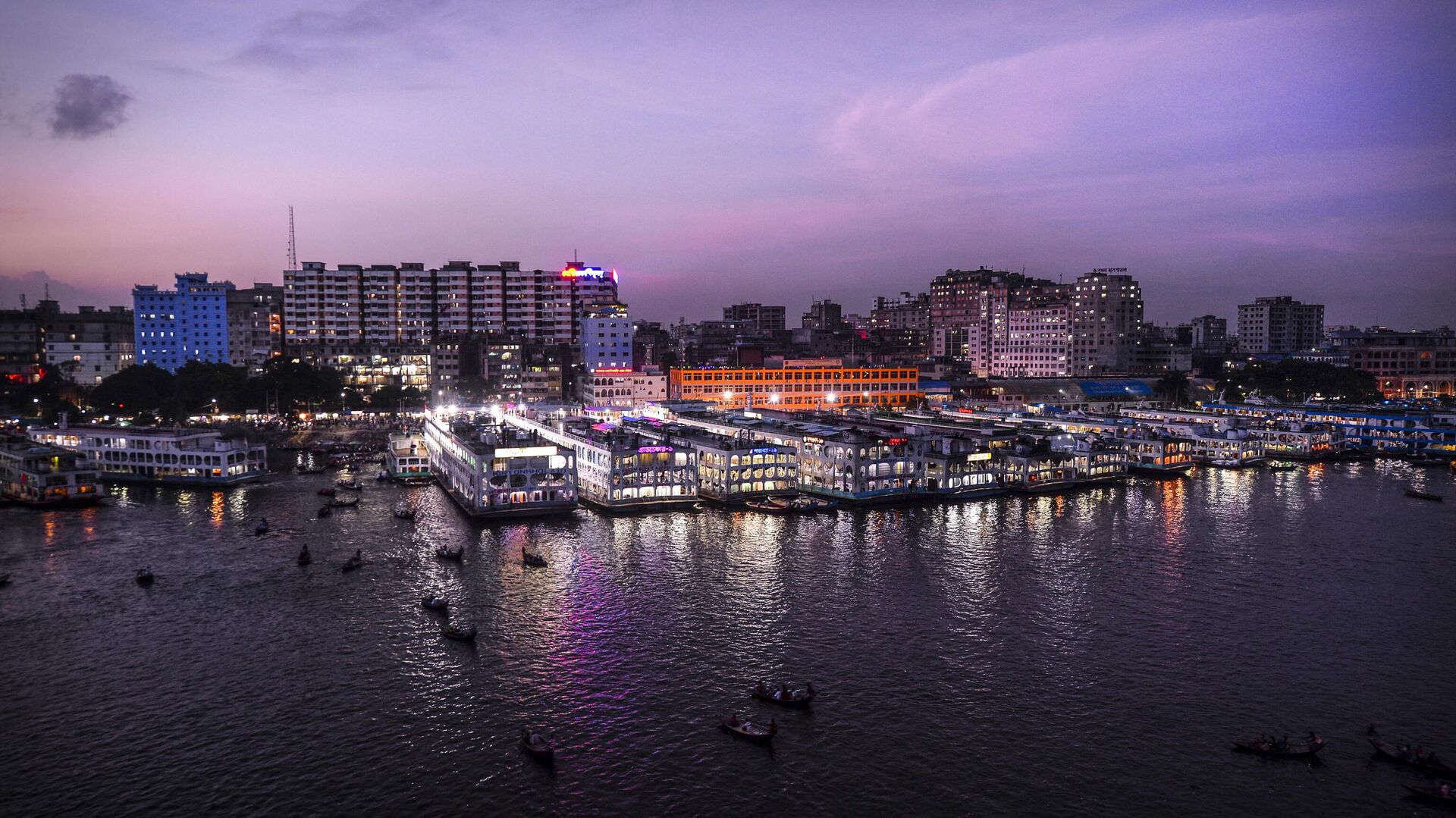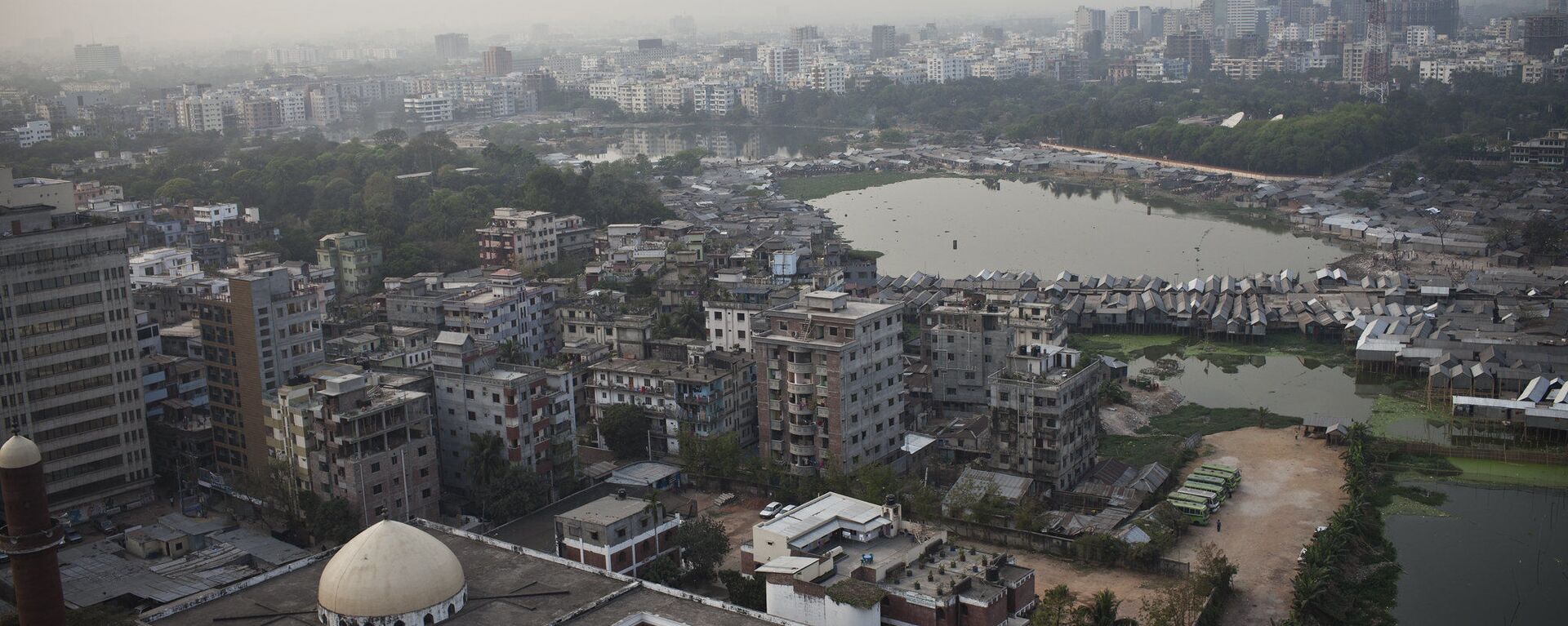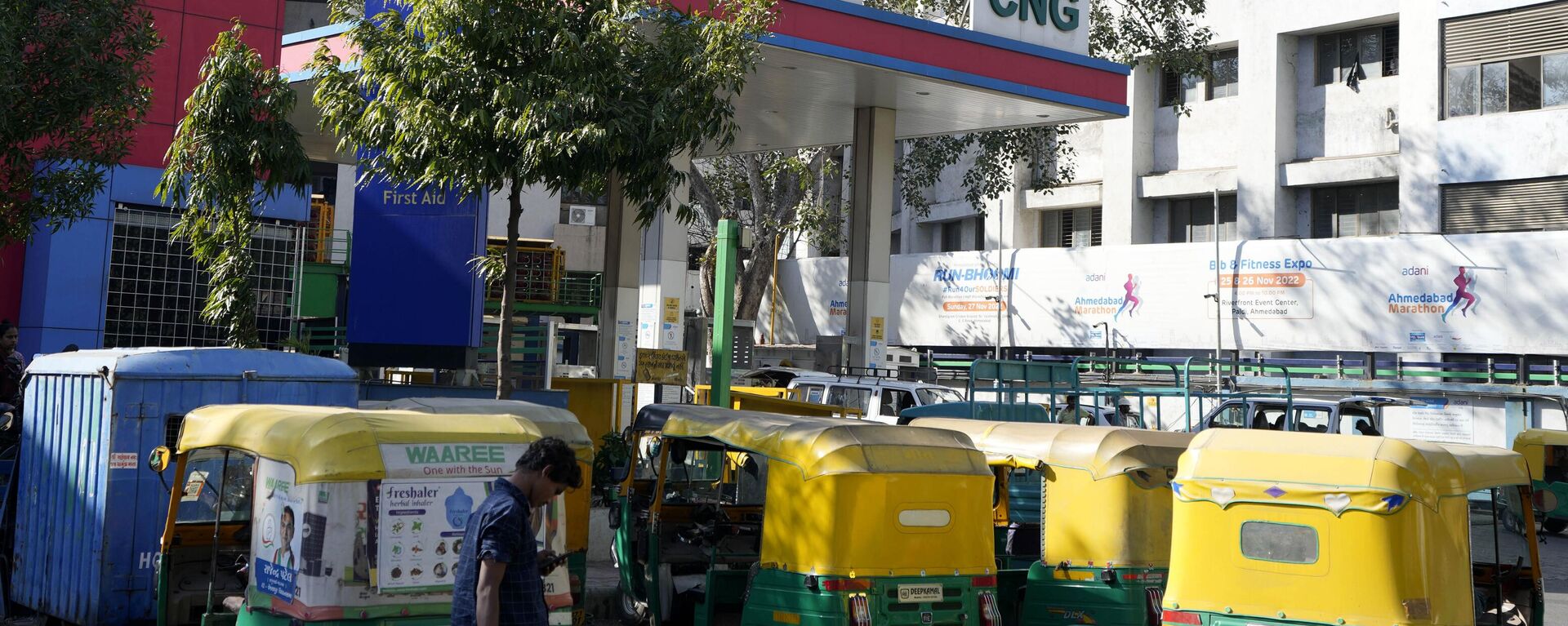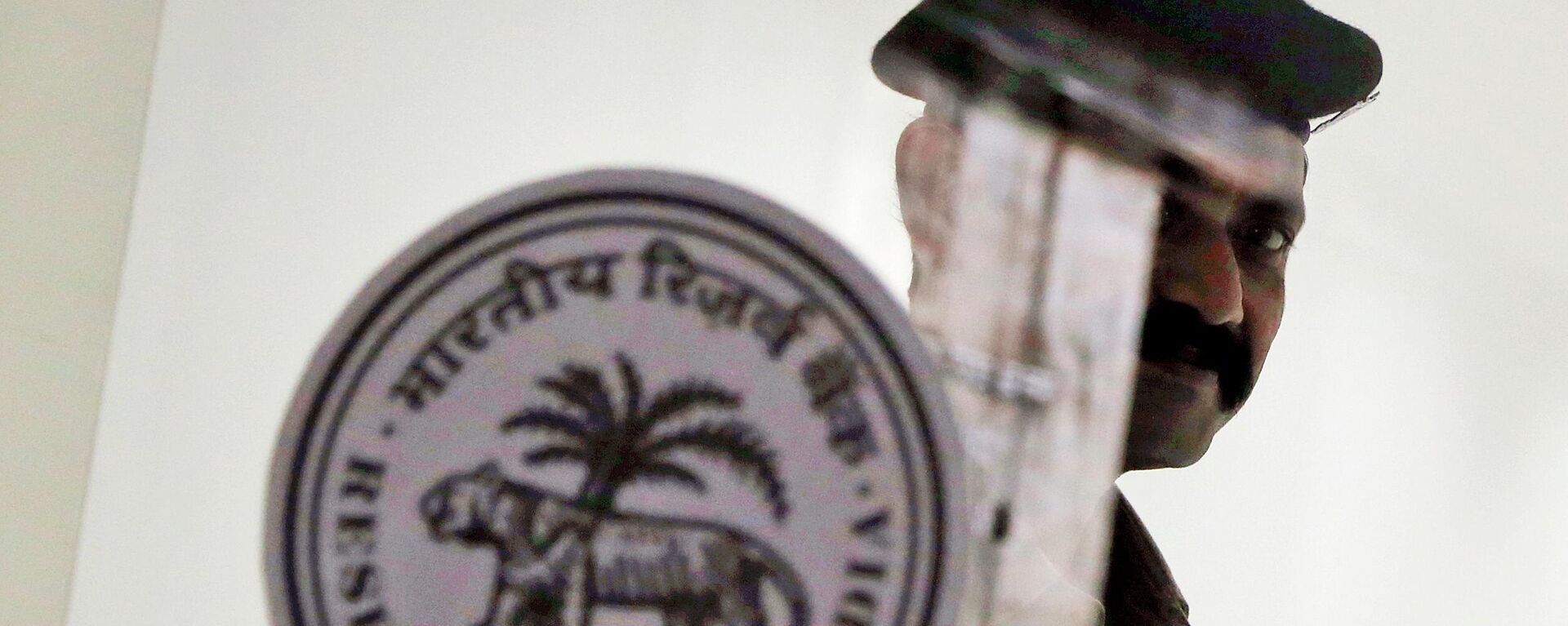https://sputniknews.in/20230213/how-bangladeshs-booming-economy-is-an-example-to-other-south-asian-countries-867656.html
How Bangladesh's Booming Economy is an Example to Other South Asian Countries
How Bangladesh's Booming Economy is an Example to Other South Asian Countries
Sputnik India
In an incredible “rags to riches” story, Bangladesh's economy has managed to pull millions out of poverty. It is one of the fastest-growing economies in the world, but how did it manage to achieve this feat and can it sustain this growth?
2023-02-13T22:35+0530
2023-02-13T22:35+0530
2023-02-13T22:35+0530
bangladesh
rising economies
women empowerment
sputnik opinion
https://cdn1.img.sputniknews.in/img/07e7/02/0d/868111_0:159:3076:1889_1920x0_80_0_0_a44fb0fd36a98df611b0bdb26307e208.jpg
Bangladesh has an inspiring story of growth and development. From being one of the poorest nations at its birth in 1971, it reached lower-middle income status in 2015. Now it is aspiring to be an upper middle-income country by 2031.In recent decades, the life expectancy in the country has risen by more than 50%, while infant mortality has declined by almost 90%. Just last year, the International Monetary Fund (IMF) predicted that Bangladesh's gross domestic product would soon exceed that of Denmark and Singapore, while per capita its GDP is already bigger than that of neighboring India.Sputnik reached out to Robinder Sachdev, geopolitical and economic diplomacy analyst as well as founder and president of the Imagindia Institute, to discuss Bangladesh's booming economy.Sputnik: What are the main reasons behind the country's relative economic success that could also serve as an example for other developing nations?Sachdev: Apart from a range of usual factors, such as economic liberalization, stable macroeconomic conditions, demographic dividend, improved education, and remittance inflows, there are two main reasons for Bangladesh's economic success, in my estimation. The first reason is the garment export industry.The garment industry contributes about 85% of the total US $55 billion exports out of Bangladesh. The success of the industry has been a big boom for job creation and manufacturing industry and it happened due to a number of factors:• low wages;• a labor regime which does not much curtail labor-market flexibility;• a lack of stronger regulations to protect workers from occupational hazards.To some extent, Bangladesh has also been lucky in the growth of its garments industry; however, some lessons may serve as examples for other developing nations, including:• promote some domestic industry that is labor-intensive, depend more on skills, and do not require higher levels of education.• promote a labor regime that is more market-friendly, and in initial stages compromise with regulations. As the industry develops, tighten those regulations.• promote setting up large firms (the main garment firms in Bangladesh are large) – and this again depends on a loose labor regime and regulations.Thus, countries can climb the first one or two rungs of the development ladder if they can establish a large, cost-competitive industry and integrate with the global supply chain. Scale definitely matters.Looking at the second reason for Bangladesh's economic success, I would say it was the empowerment of women and grassroots.[Editor's note: A grassroots movement is one that uses the people in a given district, region, or community as the basis for a political or economic movement. Grassroots movements and organizations use collective action at the local level to effect change at the local, regional, national or international level.]The social and economic empowerment of women was specifically helped by organizations like the Grameen Bank and BRAC, and then later by the government.Thus, women empowerment has played a big role – but this could not have happened in the absence of organizations like Grameen Bank, that spread financial inclusion and micro-credit across the country.[Editor's note: Grameen Bank is a Bangladeshi bank that was founded by economist Muhammad Yunus as a means of providing small loans to poor individuals (microcredit). In 2006, Grameen and Yunus were awarded the Nobel Peace Prize. The bank is headquartered in Dhaka, but it has more than 2,200 branches in the country.]Thus creation, promotion of social organizations like a Grameen Bank, which are critical for women empowerment, is an example of Bangladesh that can be followed and replicated by other developing nations.Sputnik: How can the government sustain this growth without falling prey to corruption and nepotism, which are often a common practice in developing countries?Sachdev: The example of Bangladesh shows that developing nations can progress despite or in spite of corruption and nepotism.In fact, Bangladesh ranks highest on the Corruption Index, compared to some South Asian nations like India (85/180), Sri Lanka (101/180), Nepal (110/180), Pakistan (140/180), and Bangladesh (147/180).Bangladesh's example has been classic. When the economy takes off in a less-developed country, then corruption, cronyism, and inequality tend to increase. Bangladesh is no exception.Though after crossing early stages of growth and an accompanying increase of corruption, when a less-developed country moves towards becoming a lower-middle-class nation and more rules-based order, then the country could move towards less corruption, and that should be the case now in Bangladesh.Spuntik: You talked about women empowerment in Bangladesh and how it was one of the "pillars" of the country's economic prosperity. Can you tell us a little more about that?Sachdev: Yes, women empowerment has been one of the two reasons for Bangladesh's economic and social progress. It is important to examine – how did this empowerment happen?It happened due to Grameen Bank in large part because it triggered, firstly, the economic opportunities and social acceptance, that further led to improved healthcare, better access to education, and increased legal protection.
https://sputniknews.in/20230213/shahabuddin-chuppu-to-become-next-bangladesh-president-after-unopposed-poll-win-867281.html
https://sputniknews.in/20230203/india-distances-itself-from-adani-power-bangladesh-deal-738982.html
https://sputniknews.in/20230106/economic-cooperation-in-south-asia-could-counter-global-headwinds-rbi-402655.html
bangladesh
Sputnik India
feedback.hindi@sputniknews.com
+74956456601
MIA „Rossiya Segodnya“
2023
Aneela Rashid
https://cdn1.img.sputniknews.in/img/07e6/0c/0d/74548_0:0:485:484_100x100_80_0_0_821526e967ae85d041e2d30ee34fa1de.jpg
Aneela Rashid
https://cdn1.img.sputniknews.in/img/07e6/0c/0d/74548_0:0:485:484_100x100_80_0_0_821526e967ae85d041e2d30ee34fa1de.jpg
News
en_IN
Sputnik India
feedback.hindi@sputniknews.com
+74956456601
MIA „Rossiya Segodnya“
Sputnik India
feedback.hindi@sputniknews.com
+74956456601
MIA „Rossiya Segodnya“
Aneela Rashid
https://cdn1.img.sputniknews.in/img/07e6/0c/0d/74548_0:0:485:484_100x100_80_0_0_821526e967ae85d041e2d30ee34fa1de.jpg
bangladesh's booming economy, what's the secret behind bangladesh's booming economy, what's behind bangladesh's booming economy, fastest-growing economy, women empowerment
bangladesh's booming economy, what's the secret behind bangladesh's booming economy, what's behind bangladesh's booming economy, fastest-growing economy, women empowerment
How Bangladesh's Booming Economy is an Example to Other South Asian Countries
In an incredible “rags to riches” story, Bangladesh's economy has managed to pull millions out of poverty. It is one of the fastest-growing economies in the world, but how did it manage to achieve this feat and can it sustain this growth?
Bangladesh has an inspiring story of growth and development. From being one of the poorest nations at its birth in 1971, it reached lower-middle income status in 2015. Now it is aspiring to be an upper middle-income country by 2031.
In recent decades, the life expectancy in the country has risen by more than 50%, while infant mortality has declined by almost 90%. Just last year, the International Monetary Fund (IMF) predicted that Bangladesh's gross domestic product would soon exceed that of Denmark and Singapore, while per capita its GDP is already bigger than that of neighboring India.
Sputnik reached out to Robinder Sachdev, geopolitical and economic diplomacy analyst as well as founder and president of the Imagindia Institute, to discuss Bangladesh's booming economy.
Sputnik: What are the main reasons behind the country's relative economic success that could also serve as an example for other developing nations?
Sachdev: Apart from a range of usual factors, such as economic liberalization, stable macroeconomic conditions, demographic dividend, improved education, and remittance inflows, there are two main reasons for Bangladesh's economic success, in my estimation. The first reason is the garment export industry.
The garment industry contributes about 85% of the total US $55 billion exports out of Bangladesh. The success of the industry has been a big boom for job creation and manufacturing industry and it happened due to a number of factors:
• a labor regime which does not much curtail labor-market flexibility;
• a lack of stronger regulations to protect workers from occupational hazards.
To some extent, Bangladesh has also been lucky in the growth of its garments industry; however, some lessons may serve as examples for other developing nations, including:
• promote some domestic industry that is labor-intensive, depend more on skills, and do not require higher levels of education.
• promote a labor regime that is more market-friendly, and in initial stages compromise with regulations. As the industry develops, tighten those regulations.
• promote setting up large firms (the main garment firms in Bangladesh are large) – and this again depends on a loose labor regime and regulations.
Thus, countries can climb the first one or two rungs of the development ladder if they can establish a large, cost-competitive industry and integrate with the global supply chain. Scale definitely matters.
Looking at the second reason for Bangladesh's economic success, I would say it was the empowerment of women and grassroots.
[Editor's note: A grassroots movement is one that uses the people in a given district, region, or community as the basis for a political or economic movement. Grassroots movements and organizations use collective action at the local level to effect change at the local, regional, national or international level.]
The social and economic empowerment of women was specifically helped by organizations like the Grameen Bank and BRAC, and then later by the government.
Thus, women empowerment has played a big role – but this could not have happened in the absence of organizations like Grameen Bank, that spread financial inclusion and micro-credit across the country.
[Editor's note: Grameen Bank is a Bangladeshi bank that was founded by economist Muhammad Yunus as a means of providing small loans to poor individuals (microcredit). In 2006, Grameen and Yunus were awarded the Nobel Peace Prize. The bank is headquartered in Dhaka, but it has more than 2,200 branches in the country.]
Thus creation, promotion of social organizations like a Grameen Bank, which are critical for women empowerment, is an example of Bangladesh that can be followed and replicated by other developing nations.
Sputnik: How can the government sustain this growth without falling prey to corruption and nepotism, which are often a common practice in developing countries?
Sachdev: The example of Bangladesh shows that developing nations can progress despite or in spite of corruption and nepotism.
In fact, Bangladesh ranks highest on the Corruption Index, compared to some South Asian nations like India (85/180), Sri Lanka (101/180), Nepal (110/180), Pakistan (140/180), and Bangladesh (147/180).
Bangladesh's example has been classic. When the economy takes off in a less-developed country, then corruption, cronyism, and inequality tend to increase. Bangladesh is no exception.
Though after crossing early stages of growth and an accompanying increase of corruption, when a less-developed country moves towards becoming a lower-middle-class nation and more rules-based order, then the country could move towards less corruption, and that should be the case now in Bangladesh.
Spuntik: You talked about women empowerment in Bangladesh and how it was one of the "pillars" of the country's economic prosperity. Can you tell us a little more about that?
Sachdev: Yes, women empowerment has been one of the two reasons for Bangladesh's economic and social progress. It is important to examine – how did this empowerment happen?
It happened due to Grameen Bank in large part because it triggered, firstly, the economic opportunities and social acceptance, that further led to improved healthcare, better access to education, and increased legal protection.





